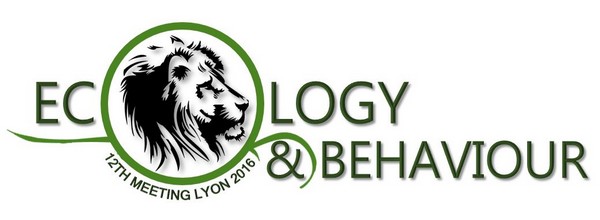Planning > Sessions description
Six sessions are proposed. Both for poster and communication submission, you will need to choose one of these sessions. A brief description of the themes expected in each session is given below. The keywords listed are not exhaustive.
Two plenary communications will be proposed for each session. The names of the invited researchers will be soon transmitted.
Session Movement ecology
Understanding and analyzing movement patterns and strategies in the wild is a crucial point in Ecology and Evolution. During the last decade, researchers have developed a new paradigm of movement ecology including four distinct approaches: random, biomechanical, cognitive and optimality. Moreover, new technologies allowed the development of increasingly robust (i.e. increased spatial and temporal resolution) and innovative tools (e.g. remote sensing, stereoscopy) improving spatio-temporal surveys of movements. This session will feature studies focusing on movements as well as their proximal and ultimate causes (e.g. foraging, resting, leaning, reproduction, intra- and interspecific interactions) in a broad range of organisms (microorganisms, plants, animals). Presentation topics will cover recent and exciting research, whatever the spatio-temporal resolution, on dispersal and migration as well as on the identification of behaviors from movement data. Presentations will focus on both observed patterns and underlying processes of these movements as well as their modelling.
Keywords: movement ecology, dispersal, migration, decision-making, animal behaviour identification, movement modelling
Session Population dynamics and genetics
Population genetics and dynamics are the two main components of studies focused on population ecology. They strongly interact and, through various measures, allow to describe populations. Indeed, free-ranging populations face multiple processes (natural or anthropic) influencing their life history traits and genetic structure. In this session, presentations will aim to provide original results emphasizing the link between behaviour and population ecology and highlighting the importance of dynamic and genetic studies to characterize population. Topics can range from the individuals scale to the inter-population scale. Thus, population dynamic issues can be approached through senescence, bio-demography and individual heterogeneity (variance of a given trait in a population). Concerning population genetics, we expect new insights about phenotypic variability, population genetic structure and hybridization.
Keywords: senescence; bio-demography; heterogeneity; phenotypic variability; population genetic structure; intra-specific scale
Session Biodiversity facing global changes
It is now widely admitted that species face increasing environmental changes at a global scale. These changes can remain isolated or occur synergistically and affect the structure and functioning of communities as well as the ecosystem services they provide. The aim of this session is to focus on the response of species and communities to global changes. The ambition is to discuss central questions in ecology through the presentation of innovating studies focused on the impact of global changes on spatial and temporal diversity patterns, but also on functional and evolutionary processes or conservation aspects. The methods used can originate a wide range of approaches from the coupling of retro-observations (long data series, paleoecology) to predictive models, to the use of genetic and genomic tools. This session also intends to conciliate this plurality of approaches with a plurality of biological models to cover the richness of this research area.
Keywords: global changes, spatial and temporal dynamics, distribution patterns, biodiversity conservation, time series analysis
Session Interspecific interactions and coevolution
Interspecific interactions play a key role in the structure and functioning of communities, which are the backbone of the functioning of ecosystems. These interactions arise from co-evolution between different partners at various evolutionary scales. This session will focus on diverse species interactions and their ecological, evolutionary and behavioural consequences. Using individual to population approaches, presentations will investigate the co-existence of species, i.e. competition, predator-prey, host-parasite and cooperation interactions. Among the main topics will figure the characterization of patterns of spatial and temporal distributions and diversity among the different partners, as well as the evolutionary processes of their interactions. The complexity of these biotic interactions underlies the plurality of approaches, experimental, empirical or genomic. Both terrestrial and aquatic models, ranging from micro to macro organisms, will be considered.
Keywords : coexistence ; predator-prey ; symbiosis ; parasitism; interspecific cooperation; interspecific competition; arms race; phylogeny; hybridization
Session Sociality and sexual selection
This session will discuss about the evolution of life history traits and behaviours driven by sexual and/or social selection. Sexual selection results from differential mating success among individuals within a population. Competition for fertilization occurs through direct competition between members of the same sex (e.g. male-male competition and sperm competition) or through the attraction of one sex to the other (e.g. female choice). Sociality is defined as the tendency of organisms to live in groups. These groups are underpinned by the social life and more precisely the social system (including social organization, social structure, mating system and social behaviour). In this session, concepts such as mate choice, communication (visual, acoustic and chemical), cooperation, intra-sexual, inter-sexual and spermatic competition will be developed at the intra-specific level.
Keywords: mate choice, communication, cooperation, competition
Session Technical and methodological innovations in ecology and evolution
This session covers all recent technical and methodological developments contributing to research in ecology and evolution. Presentations will take into account three aspects: modelling (e.g. software development, population dynamics, epidemiological models), molecular tools (e.g. genetics, genomics, transcriptomics), cartographic tools (e.g. automated photo-interpretation) and instrumentation (e.g. use of harmonic radar to track the movement of organisms). The objective of this session is to present technical and methodological innovations answering current issues in ecology and to promote international collaborations. The presentations will therefore focus on these technical and methodological aspects while giving a quick overview of the potential applications in ecology, evolution, and behavioral studies.
Keywords : modelling, molecular tools, mapping tools, technical and methodological innovations


